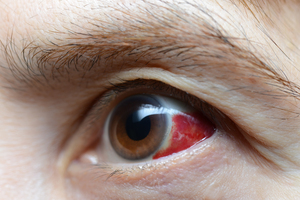Key points
- Peanut allergies are caused by an adverse immune response to peanut protein, affecting around 1% of the American population.
- Symptoms range from mild, such as hives and itching, to severe, including potentially life-threatening anaphylaxis.
- Peanut allergies can be triggered through direct contact, cross-contact, or inhalation of peanut particles.
- The best way to manage a peanut allergy is to avoid peanuts and products containing peanuts, and to seek immediate medical attention if exposure occurs.
- While there is no known prevention for peanut allergies, early introduction of peanuts to infants may help reduce the risk in some high-risk individuals.

Having a peanut butter allergy can be a life-altering diagnosis because exposure to peanuts or peanut butter can lead to severe symptoms — even death. For those who have a peanut allergy and parents of children with a peanut butter allergy, understanding the causes, symptoms, and treatment is essential for living a happy and productive life despite this allergy. According to the Children’s Hospital of Philidelphia (CHOP), knowing what to do if an exposure occurs can also save precious minutes during a potentially life-threatening reaction.
Continue reading to gain valuable insights into managing and addressing this prevalent food allergy.
What Is a Peanut Allergy?
A peanut allergy is an adverse immune response to peanut protein, according to CHOP. They explain that when someone with a peanut allergy comes into contact with peanut protein, their immune system mistakenly identifies the proteins as harmful and triggers a range of symptoms, which can vary from mild to severe. People who have a "tree nut allergy" will also be allergic to peanut butter and other foods that have peanuts in the ingredients. Around 1% of the American population, including 1 in 50 children, have a tree nut allergy, according to the American Academy of Asthma, Allergy, and Immunology (AAAAI).
These symptoms may include hives, itching, swelling, digestive issues, and in severe cases, anaphylaxis, which is a life-threatening condition that requires immediate medical attention. Having a peanut allergy can be a lifelong allergy, so CHOP notes that the best way to manage it is to avoid peanuts and products containing peanuts. They also note that if you suspect a peanut allergy, it's important to consult a healthcare professional for proper diagnosis and management.
What Are the Symptoms of a Peanut Allergy?
The symptoms of a peanut allergy can vary widely in severity, according to the Mayo Clinic. Symptoms may include:
-
Skin reactions such as hives, redness, or swelling
-
Itching or tingling in or around the mouth and throat
-
Digestive problems like nausea, vomiting, or diarrhea
-
Shortness of breath or wheezing
-
Runny or congested nose
-
Tightening of the throat
-
Anaphylaxis — a severe and potentially life-threatening reaction that can include a rapid drop in blood pressure, loss of consciousness, and constriction of the airways
The Mayo Clinic also notes that symptoms can occur within minutes of exposure to peanuts and can vary from person to person. So, if you suspect a peanut allergy, it's important to know what symptoms to look out for and when to seek medical treatment.
What Is Anaphylaxis?
Anaphylaxis is a severe, potentially life-threatening allergic reaction that can occur quickly after exposure to an allergen, such as peanuts. It can affect multiple systems in the body and may lead to a range of symptoms, including:
-
Constriction of the airways, leading to difficulty breathing
-
A rapid drop in blood pressure, causing dizziness or fainting
-
Racing heartbeat
-
Severe hives or skin reactions
-
Swelling of the throat, which can obstruct the airway
-
Nausea, vomiting, or diarrhea
Anaphylaxis requires immediate medical attention, and if left untreated, it can be fatal. Anyone experiencing symptoms of anaphylaxis should seek emergency medical care, and individuals at risk of anaphylaxis should carry an epinephrine auto-injector at all times. Prompt treatment with epinephrine can help reverse the symptoms of anaphylaxis and prevent further complications.
What Are Peanut Allergy Main Causes?
Peanut allergies are caused by an abnormal immune response to peanut proteins. The exact reasons why some individuals develop peanut allergies while others do not are not fully understood, according to the Mayo Clinic, but they explain that it is believed to involve a combination of a few factors, including:
-
Genetic predisposition
-
Early exposure
-
Immune system response
-
Environmental factors
It's important to note that the causes of peanut allergies are complex and not fully understood, however, research in this area is ongoing according to the AAAAI.
How Can Peanut Allergies Be Triggered?
According to the Mayo Clinic, peanut allergies can be triggered in several ways, including:
-
Direct contact: Directly consuming peanuts or peanut-containing products — even small amounts of peanuts or peanut residue.
-
Cross-contact: Cross-contact occurs when a food that does not contain peanuts comes into contact with peanuts or peanut residue, leading to accidental ingestion of peanuts. This can happen during food preparation, handling, or processing.
-
Inhalation: In some cases, inhaling airborne particles of peanuts, such as peanut dust or aerosolized peanut proteins, can trigger an allergic reaction, particularly in individuals who are highly sensitive to peanut proteins.
Individuals with peanut allergies need to be vigilant about reading food labels, asking about ingredients when dining out, and being aware of potential sources of cross-contact. Additionally, carrying an epinephrine auto-injector and having an emergency action plan in place is crucial for managing accidental exposure to peanuts, according to the Mayo Clinic.
How Is a Peanut Allergy Diagnosed?
A peanut allergy is a common food allergy, according to the Mayo Clinic. They note that it is typically diagnosed through a combination of medical history, physical examination, and specific food allergy testing. Allergy testing can include skin prick tests or blood tests, according to AAAAI. These tests can help identify specific allergens, including peanut proteins.
Another common allergy test is the oral food challenge, according to the AAAAI. An oral food challenge is usually conducted under the direct supervision of an allergist, they note. During this test, the individual consumes gradually increasing amounts of peanuts to determine if an allergic reaction occurs.
If a peanut allergy is suspected, it's crucial to consult an allergist or immunologist for proper diagnosis and management, according to the Mayo Clinic. They can provide personalized guidance on allergy testing, treatment options, and developing an individualized management plan.
How Can I Prevent a Peanut Allergy?
Currently, there is no known method to prevent the development of a peanut allergy, according to AAAAI. However, early introduction of peanuts to infants, under the guidance of a healthcare professional, may help reduce the risk of developing a peanut allergy in some high-risk individuals, they note. It's important to consult with a pediatrician or allergist before introducing peanuts to infants, especially if there is a family history of allergies.
Additionally, oral immunotherapy is being studied as a potential approach to desensitize individuals with peanut allergies, according to the Mayo Clinic. However, oral immunotherapy should only be considered under the guidance of a qualified allergist or immunologist, as it carries risks and requires close monitoring.
When Should You See a Doctor?
It is important to see a doctor if you suspect that you or someone else may have a peanut allergy — especially if exposure to peanuts has occurred. Some situations that require immediate medical attention, according to the Mayo Clinic, include:
-
Experiencing symptoms of a peanut allergy after consuming peanuts or peanut-containing products, such as hives, swelling, difficulty breathing, or digestive issues.
-
If you or someone else has a known peanut allergy and accidentally ingests peanuts, leading to an allergic reaction.
-
If there are concerns about potential peanut allergy in infants or young children, especially if there is a family history of nut allergies or other food allergies.
Additionally, the Mayo Clinic notes that it's important to consult a doctor to discuss a management plan for peanut allergies, including obtaining a proper diagnosis, developing an emergency action plan, and receiving guidance on avoiding peanuts and managing potential exposures.
For a medical emergency, such as symptoms of an allergic reaction, dial 911 or visit your closest emergency room immediately.
FAQs
What is a peanut allergy?
A peanut allergy is an adverse immune response to peanut protein, which can cause a range of symptoms from mild to severe.
What are the symptoms of a peanut allergy?
Symptoms can include skin reactions, itching, digestive problems, shortness of breath, and in severe cases, anaphylaxis.
How can a peanut allergy be triggered?
Peanut allergies can be triggered by direct contact with peanuts, cross-contact with peanut residue, or inhalation of airborne peanut particles.
How is a peanut allergy diagnosed?
A peanut allergy is typically diagnosed through a combination of medical history, physical examination, and specific food allergy testing, such as skin prick tests or blood tests.
Can a peanut allergy be prevented?
Currently, there is no known method to prevent a peanut allergy. However, early introduction of peanuts to infants under the guidance of a healthcare professional may reduce the risk in some high-risk individuals.









